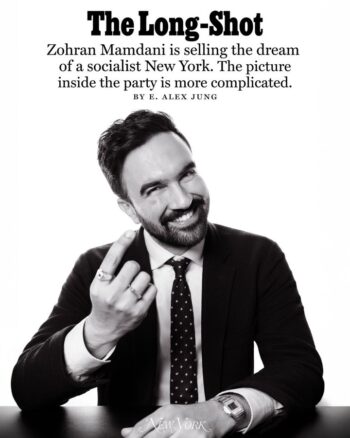
Sure, you may like the idea of a “socialist New York,” but New York magazine (5/20/25) is here with a bunch of anonymous sources to tell you it’s “more complicated.”
There’s an art to writing a profile of a political candidate that sows doubt about their fitness for office without attacking them directly. Done smoothly, it can be more damaging than an overt hit piece.
“Zohran Mamdani Crashes the Party,” a recent New York magazine profile (5/20/25) of the New York State Assembly member and New York City mayoral candidate, is a prime example. The headline and subhead (“He’s selling the dream of a socialist New York. The picture inside the Democratic party is more complicated.”) manage to convey knowing sympathy (party-crashing is cool!) and parental concern (a socialist New York is but a “dream,” and party insiders know the reality is “more complicated”).
The story’s author, E. Alex Jung, is not a Free Press columnist but a National Magazine Award–nominated features writer who comes across as sympathetic to but skeptical of Mamdani. Mamdani, he writes,
has given hope to people who are in despair about the state of the country…showing up at protests for trans rights and shouting at Tom Homan while State Police officers hold him back—and then posting it all on Instagram.
Jung added that Mamdani
became the first to max out the city’s campaign matching funds and had more individual donors than the rest of the field combined…. His campaign has built the largest field program ever for a mayoral race: Around 22,000 volunteers have knocked on 450,000 doors and made 140,000 phone calls…. The rally at Brooklyn Steel was a demonstration to the city’s progressive power brokers that the time to consolidate behind their candidate was yesterday—that he was the only one who could slay the big bad, former Gov. Andrew Cuomo. Though the odds of that happening are not good.
Part of subtly and effectively undermining someone is appearing to give them their due. As ex-Gov. Andrew Cuomo said of his rival Mamdani during a recent NYC mayoral debate:
Mr. Mamdani is very good on Twitter and with videos, but he actually produces nothing…. He has no experience with Washington, no experience with New York City.
Like Cuomo, New York acknowledges upfront that Mamdani is an exceptionally strong communicator. It then puts forth a string of criticisms, most from unnamed colleagues and critics of Mamdani, with their own agendas and reasons to resent his rise. An “anti-Cuomo Democratic strategist” dismisses Mamdani supporters as “online kids.” Critics claim he is “drawn to attention-grabbing stunts rather than the grind of whipping votes.” Because Jung allows anonymous sources to criticize Mamdani at length—he quotes or paraphrases “those with knowledge of the conversations,” “some New York Democratic Party members,” “a Democratic political operative,” “another operative,” “critics,” “detractors” and so on—the reader has no way of independently assessing their motives.
‘Language of the internet’
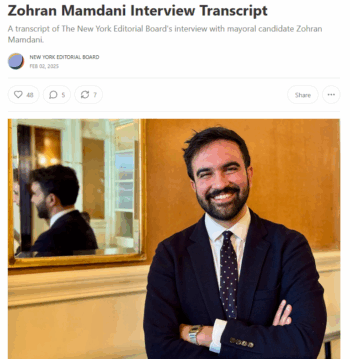
The New York Editorial Board (2/2/25), “a group of veteran journalists interviewing candidates for Mayor of New York City,” got specifics on the questions New York said were “unclear.”
The profile opens with a shower of trivializing compliments. Mamdani and his “congregation of true believers” are “jubilant and young.” Supporters like Kamala Harris’s stepdaughter Ella Emhoff and semi-canceled chef Alison Roman represent “power and cool and changing winds.” Mamdani is “a Democratic Socialists of America–backed candidate” (as a DSA member, I can confirm) with a “short work history and a long history of pro-Palestinian advocacy”—qualities, Jung writes, that were “seen as nonstarters within the small electorate that ultimately decides the race.”
Yet in the last six months, he has “transformed the race with memorable policy proposals and a winning social-media presence. If you’re online, he seems to be the only candidate with Wi-Fi.” His campaign videos are “in the language of the internet.”
So far, a reader will have learned that Mamdani is young, cool and online. His campaign pitch—Freeze the rent! Make buses fast and free! Universal childcare!—is catchy, as is his plan to tax the rich and big corporations, provide free buses and municipal grocery stores, and establish a department of community safety. But how New Yorkers feel about these proposals and “how he would actually do all of this” is “unclear”—whether because Jung neglected to ask, or was unsatisfied with the answer, we’ll never know.
Profiles like this are popular because they are more about personality and style than sober, eat-your-vegetables political analysis. Thus, we learn that Mamdani is “energetic, enthusiastic, quick with a joke, and good-looking in a ‘Who’s your brother’s friend?’ kind of way.” It’s a vivid description, and it’s reminiscent of ex-Sen. Claire McCaskill’s blistering dismissal of Rep. Alexandria Ocasio-Cortez: She was, McCaskill said, a “bright, shiny new object” whose rhetoric was “cheap” (Business Insider, 12/26/18).
‘Smothering effect on discourse’
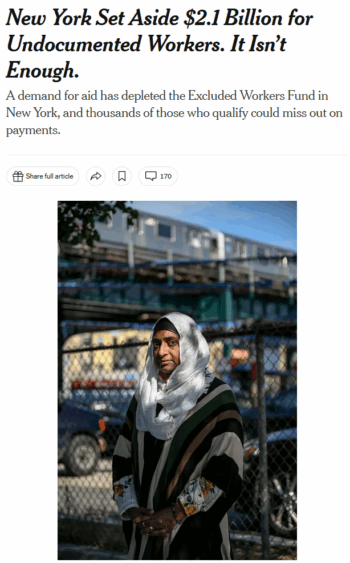
New York scorned the “ideological purity” that made Mamdani insist that marginalized workers ought to have gotten the support they needed (New York Times, 10/19/21).
Jung contends without evidence that Mamdani supporters have had “a smothering effect on discourse, making any public criticism or dissent verboten within parts of the left.” He goes on to quote state Sen. Jabari Brisport, who was elected alongside Mamdani in 2020. Unlike most of Jung’s sources, Brisport is a Mamdani supporter and willing to speak on the record. “People were looking for drastic changes in society,” Brisport says of the period in which they were elected.
But according to Jung, the “reality of the chamber was different.” Recounting a fight between moderate and progressive Democrats over whether to tax the rich and expand a fund for undocumented workers who had been denied federal pandemic relief, he implies that Mamdani was outmaneuvered. Legislators eventually agreed to set aside $2.1 billion for the excluded-workers fund—far short of the $3.5 billion that progressives wanted and, it’s important to note, excluded workers needed.
Mamdani and some colleagues indicated to New York State Assembly Speaker Carl Heastie that they would protest the shortfall by voting against the budget, which would have passed regardless. Heastie “warned that the fund would get watered down even more if they didn’t fall in line.” (Heastie denies this.) Mamdani, Jung writes, was “in a panic, unsure of what to do. Accept less than what you believe or risk losing even more?”
Unwilling to risk it, Mamdani ended up voting for a budget he had initially opposed as insufficient. Yet somehow the villain of this story is not Heastie, who apparently threatened to withhold even more money from people in need, but Mamdani, who is implied to have shown poor judgment and “earned a reputation for ideological purity.”
The evidence? He pushed hard for single-payer healthcare, fought side-by-side with city taxi drivers to win hundreds of millions of dollars in debt relief from the city, joined a protest encampment by cab drivers outside City Hall, and convinced Chuck Schumer to film a video calling attention to the cabbies’ plight via the story of one whose brother, a fellow driver, killed himself under enormous financial pressure. Where outlets like New York see an obsession with “ideological purity,” others see a willingness to fight.
‘A show pony, not a workhorse’
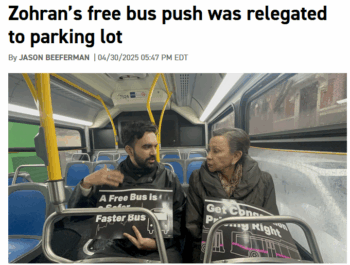
Politico (4/30/25) blamed Mamdani for the end of a free bus pilot program because he didn’t understand that “you’re either a team player or you’re not.”
Mamdani also got Senate Deputy Leader Mike Gianaris to co-sponsor an eight-bill legislative package known as Fix the MTA, which would have frozen fares, instituted six-minute service on subways, and phased in free buses over four years. He spent $22,000 of his own campaign money to promote it.
It didn’t have the unqualified backing of Gov. Hochul or the MTA, so Mamdani texted Mayor Eric Adams, who had mentioned that he found the dictator Idi Amin fascinating, and arranged a dinner with the mayor and Mamdani’s father, whom Amin had expelled from Uganda. Mamdani then convinced Adams to take a photo with a poster touting free buses, and film a quick video to support the program—all of which led to earned media, and resulted in a fare-free-bus pilot being included in the 2023 budget. “It was a success,” Jung writes.
Some might conclude that Mamdani is resourceful and effective. But Jung cautions us to curb our enthusiasm. “For Mamdani,” Jung writes, “this was an example of his ability to work with someone…whom he was critical of and yet recognized as a potential ally.” But wait: Unnamed legislators told Jung that Mamdani could have extended the bus program during the 2024 budget negotiations, but he “took issue” with a part of the budget that would make it easier for landlords to claim they were doing needed repairs while raising rents on rent-stabilized units—a major loophole in New York’s tenant protections.
According to Politico (4/30/25), when Mamdani told Heastie he planned to vote against the budget because of this, Heastie threatened to kill the expansion of the free-bus pilot. Mamdani refused to back down this time, so Heastie pulled the plug on free buses. (Heastie and Mamdani say this didn’t happen.) “That is literally a material good being delivered to the working class…. And [Mamdani] threw it away for a performance,” an unnamed legislator told Jung.
Despite the allegation that Heastie killed free buses because Mamdani wouldn’t support a budget he believed would harm his constituents, Jung again portrays Mamdani as incompetent: “He appeared to realize he’d made a mistake,” and tried and failed during this year’s budget negotiations “to get free buses back on the agenda, this time by attempting to leverage his district’s capital funds.” (The campaign, again, denies this.)
“That to me demonstrates how he operates—you can talk about doing things, but that alone is not going to achieve those things,” yet another unnamed colleague of Mamdani’s tells Jung. What “some New York Democratic Party members”—again, unnamed—see as Mamdani’s legislative missteps “have given them pause about his ability to govern…. They see him as a show pony, not a workhorse,” Jung writes.
It’s a trope often invoked to discredit social media-savvy progressives. As Caroline Fredrickson, president emerita of the American Constitution Society, said of Rep. Ocasio-Cortez in 2019 (Guardian, 12/24/19): “A lot of people expected a show pony. But it turns out she’s a workhorse.”
‘Aura of privilege’
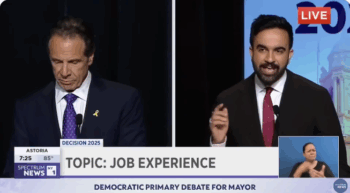
“Mamdani’s moral clarity has the aura of privilege,” New York snarked, implicitly contrasting him with—Andrew Cuomo (NY1, 6/12/25)?
In addition to casting doubt on Mamdani’s ability to govern, Jung implies that the everyday New Yorkers who admire him are shallow and naive. “Literally this morning I posted you on my Instagram story!” one young woman tells Mamdani, adding, “I’m so emotional seeing you. Like, you’re real.” As a number of public forums and events have made clear, many Mamdani supporters know and care a great deal about policy, while also using Instagram. But you wouldn’t know that from this profile.
Perhaps the most insidious aspect of profiles like these is the suggestion that it’s hypocritical to fight for poor and working-class people when you are not poor or working-class. (Mamdani’s father, Mahmood Mamdani, is a Columbia professor, and his mother, Mira Nair, is a prominent filmmaker.)
The candidate’s “moral clarity,” which many appreciate, has “the aura of privilege,” Jung writes. He asks about “the combination of the relative privilege in [Mamdani’s] own life and the working-class people at the center of his politics.” But to admirers of, say, Franklin Delano Roosevelt or Mexican President Claudia Sheinbaum, there is nothing suspect or contradictory about rich and upper-middle-class people standing in solidarity with their poor and working-class counterparts.
Jung acknowledges that Mamdani has “given hope to people who are in despair…and looking for someone with real fight.” Yet, ultimately, he sees the “appeal of [Mamdani’s] message” as its “simplicity and memeability”—not specific policies or his willingness to battle for them. The final quote is the most telling: “The thing about being a legislator and making compromises is that poor people make compromises every single day,” an unnamed colleague of Mamdani’s tells Jung. “Poor people know what is important, and sometimes they have to choose between two important things.”
It could be that poor people are born knowing how to prioritize and negotiate. Or it could be that politicians force them to choose between, for example, reliable transit and affordable housing. This profile creates the impression that Mamdani is unwilling to compromise and unfit to govern. But it’s just as plausible that his rejection of such false dichotomies has made some colleagues eager to keep him out of the mayor’s office.
This content originally appeared on FAIR and was authored by Raina Lipsitz.